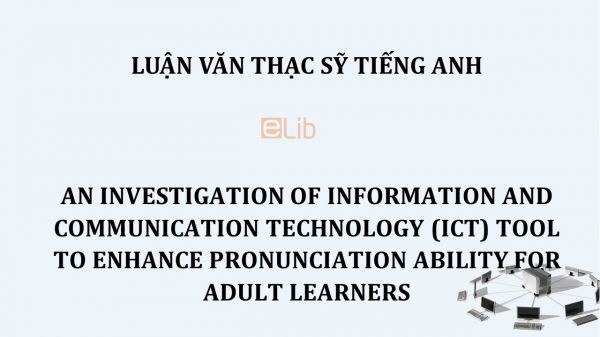MA-Thesis: An investigation of information and communication technology (ict) tool to enhance pronunciation ability for adult learners
MA-Thesis An investigation of information and communication technology (ict) tool to enhance pronunciation ability for adult learners to investigate an ICT tool, MyET in this study, in relation with the improvement of pronunciation ability for non-major English students at Thai Nguyen University (TNU). An action research was conducted at New Edu English Centre with the participation of 20 students from TNU
Mục lục nội dung

1. Preface
1.1 Rationale
In the current trend of globalization, the demand on language skills for the workforce is becoming more urgent. Good English language proficiency has remained one of the crucial elements which not only contributes to the success of a job application, especially in developed areas in Vietnam but also better prepare language learners for the future of a global citizen that they may become. For these reasons, a great number of researchers, authors and teachers have kept trying researching and applying different teaching methods with a view to creating the most effective learning environment for learners
1.2 Aims of the study
The objectives of the research are to identify pronunciation strategies employed by adult learners and explore the impact of MyET that supports these strategies. This study will also aim to identify challenges of using MyET in general effective pronunciation learning techniques
1.3 The research questions
What is “pronunciation”?
1.4 Scope of the study
This research explores one major ICT tool called MyET to improve pronunciation for adult learners. The scope of the study is within adult learners who are students of Thai Nguyen University.
1.5 The significance of this study
The research aims to contribute to help English language learners improve their pronunciation. The research can provide learners better awareness of the advantages and drawbacks of using ICT tools in general and MyET in particular for pronunciation practice and give suggestions on effective learning pronunciation strategies
2. Content
2.1 Literature review
Theoretical background
The role of technology in language teaching
Previous studies
2.2 Research methodology
Theoretical framework
Research questions
Participants
MyET
Data collection instruments
Data analysis
Action plan
2.3 Findings and discussion
Data collected from questionnaires
Data collected from Pretest and Posttest
3. Conclusion
Results from the questionnaires show that more than half of the participants have negative opinion about their ability to pronounce or speak a foreign language. A large number of students (80%) believe that their limited pronunciation ability is due to their rare practice after class hours. Also, although all students surveyed are well aware that English and Vietnamese sounds are different, it seems that confusion of sounds still exists as over 60% of students found themselves producing similar sounds to that of Vietnamese sounds. The reasons for students’ limited pronunciation ability in their own views are presented in the following table.
4. References
Abbas Pourhosein Gilakjani (2016). English pronunciation instruction: A literature review. Online published November 18, 2016.
Aja Dailey, 2009. Implementing Task-Based Language Teaching in Korean Classrooms.
Andrea Esteve Recatalà (2005). Teaching Pronunciation through ITC tools: A case study. Universitat Jaume I, Spain.
-- Nhấn nút TẢI VỀ hoặc XEM ONLINE để tham khảo đầy đủ nội dung Luận văn ThS Tiếng anh trên--



